North Face
Introduction
The Nordwand, or North Face of the Eiger, is one of the great challenges to modern climbers even with high-tech boots, clothes, rope, pitons and navigational equipment. When Andreas 'Andi' Hinterstoisser and Toni Kurz decided to take on the challenge in 1936 they had woolen socks and gloves, hemp rope and pitons that they had forged themselves. From the poor village of Berchtesgaden, they only have enough money for equipment so have to cycle the 700 kilometers to the base camp in Berne, Switzerland.
The two attract the attention of Henry Arau, a senior reporter at the Berliner Zeitung and a young woman who wants to be a photo journalist and knows the two so is eager to follow them and write the story herself. This feat also has the attention of the National Socialist Party as they want something heroic to show of the athleticism of German youth prior to Germany's hosting of the 1936 Olympic Games and, coincidentally, another couple of climbers are Austrian, climbing with the backing of the SA so this plays very well into the forthcoming Anschluss.
Toni and Andi begin plotting their route, different from everyone else's, and make an early reconnaissance climb to store some of their equipment in a cave to make the initial climb easier. With the attention they gain at a dinner in the nearby hotel, their Austrian rivals overhear their planned route and when the two Germans begin their ascent they find the Austrians hot on their tails. During the climb, the men begin as competitors but slowly become comrades, realising that the ascent is so difficult that they are better off together.
Cutting between the mountain and those following the ascent from the luxury of the hotel, we see different sides to the men, how they are and how Germany wants them to be, with Luise emotionally involved contrasting with Henry Arau who either wants a glorious victory or a spectacular failure, not particularly caring which he gets.
This film is based on their true story but invents the character of Luise as a love interest to increase the drama and tension.
Video
Mountain-climbing films are generally extremely visually impressive and the cinematography and direction (by Kolja Brandt and Philipp Stölzl respectively) is stunning, giving you a real sense of the danger and inclement weather on the mountain, juxtaposing superbly with the opulence in the hotel and how far removed those watching the ascent are from conditions on the mountain.
The picture is stunning, with lush colours and deep blacks in the scenes set in the hotel and a slightly grittier and less polished look to the mountain scenes. The CGI is excellent and I was pushed to make out what was green screen and what was really shot - turns out there's much more CGI than I thought, which is always a good thing. The way it is shot really has your stomach in a knot, rooting for the climbers and flinching when something goes awry.
*The pictures contained in this review are from the DVD and do not reflect the image quality of the Blu-ray Disc.*
Audio
The only audio option is the German DTS-HD MA track with English subtitles and, like the visuals, this is breathtaking. The wind howls around the room and the rocks, snow and ice seem to fall past you - it's amazing the physical effect such sounds can have as the person I watched it with said she felt cold at times! The subtitles are very good, translating the dialogue pretty faithfully (at least as far as I could make out with my GCSE German!) and the captions are also translated but, as this was done for the American market, things like 17 uhr 30 appear at the top as 5:30 pm - aren't we used to the 24-hour clock by now? Still, these things are at the top of the screen so are easy to ignore if you can figure out the caption without assistance.
Extra Features
There is a decent selection of supplementary material, the first two (a Making Of and a brief look at the visual effects) concentrate on different aspects of filming which, though not completely exhaustive, give a reasonable impression of how the film was made and CGI incorporated. The six deleted scenes are interesting, but don't cry out for re-insertion with the extended scenes rightly trimmed.
The rest of the material is all text, appearing in a small box to the right of the screen. There is a magazine interview with Philipp Stölzl and Kolja Brandt, an exploration of why the North Face is such a challenge and a timeline of all the attempts on the mountain, both going up and down - I didn't realise people skied down the mountain or how fast some can mow scale the North Face.
Finally, there are two trailers: the theatrical which is subtitled and a new one for the UK which is much better quality.
Conclusion
Comparisons with Touching the Void are going to be inevitable as both are based on true stories and both are incredibly well-made and thoroughly gripping. The camera acts as another climber, really pulling you in and putting you on the mountain. I didn't know the story and whether they succeeded, so I'm not going to tell you here as you're better off not knowing the ending, as that keeps you involved for longer.
The two leads, Benno Fürmann (Toni Kurz) and Florian Lukas (Andreas Hinterstoisser), are outstanding, really looking the part and easily passing as real mountain climbers. They also have a terrific rapport and are completely believable as Alpinists from the 1930s, thanks in no small part to the attention to detail and period costumes. Though an invention and plot device, Johanna Wokalek is splendid as the young reporter and love interest, whose personal involvement ultimately jeopardises her career. There are smaller though important roles, for the two Austrian climbers (Willy and Edi) and Henry Arau and the actors do a sterling job portraying them.
All in all, North Face is a remarkable visual experience (certainly more involving than Cliffhanger!), with brilliant AV quality and whilst the extras package may not be as good as other BDs, it is a film definitely worth a rent and possibly a purchase.
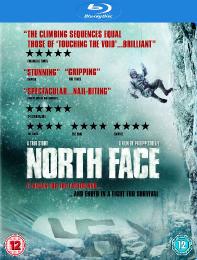












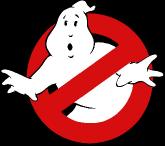



















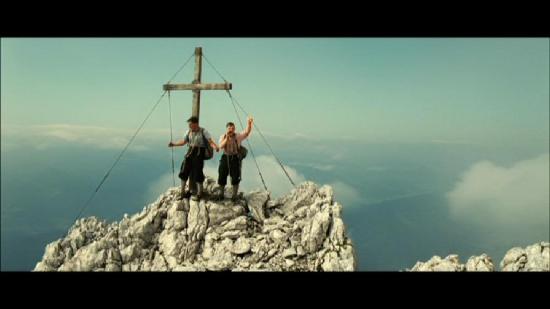
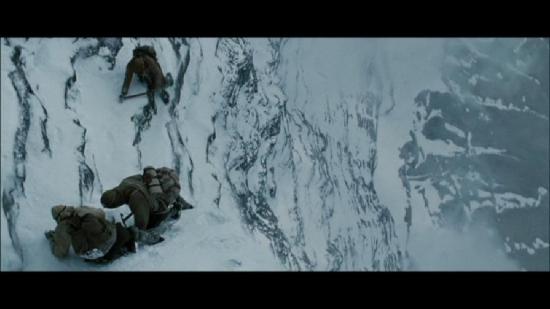
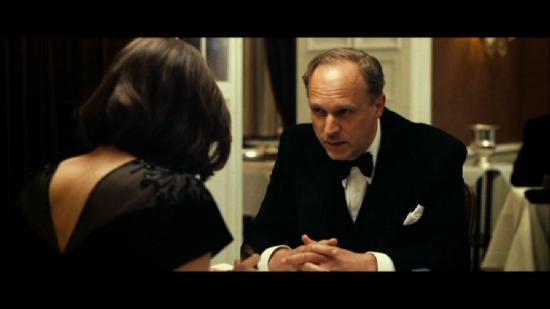
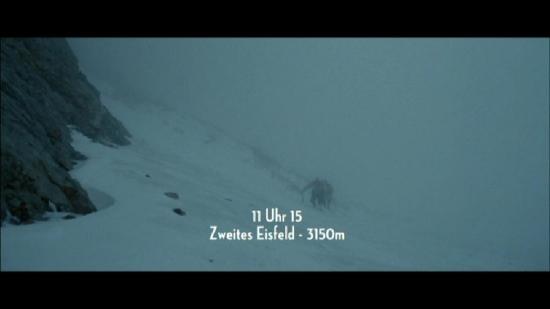
Your Opinions and Comments
Be the first to post a comment!